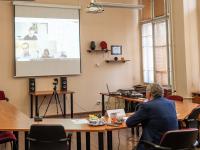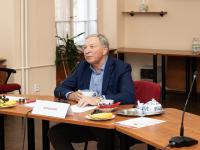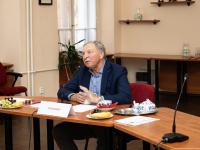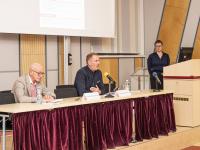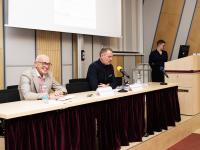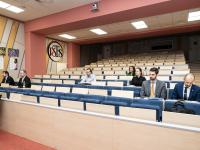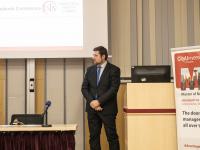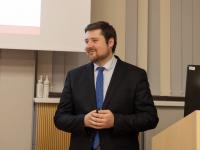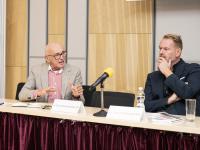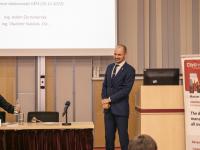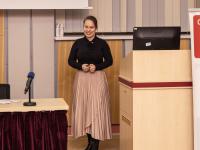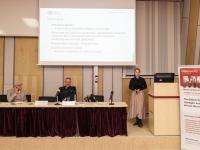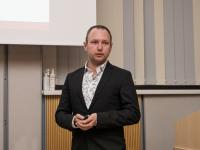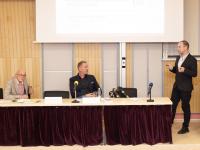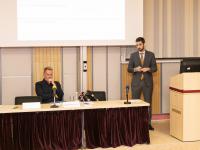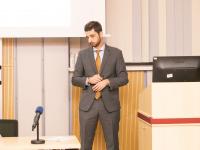THE DOCTORAL STUDENTS CONFERENCE AT THE UNIVERSITY OF FINANCE AND ADMINISTRATION 2023
In 2021 and 2022 the attention of global society was focused on two major events. The first event was the COVID-19 crisis and the second was the war in Ukraine. In 2023, the world will be rocked by the military conflict between Israel and Hamas. The black swan theory of Lebanese author Nassim Taleb has taken shape in recent years in the form of unexpected and exceptionally destructive forces, both natural and human. The world, according to UN Secretary-General Guterres, is ceasing to function and nations are ill-prepared to solve their problems: “Our world is in peril — and paralyzed. Let us work as one, as a coalition of the world, as united nations” (New York, General Debate of the 77th Session of the UN General Assembly September 2022).
The Age of Imbalance is saturated with uncertainty. It is only with difficulty that we can forecast and foresee reliable scenarios of future developments using scientific models, economic forecasts, or socio-political trends. Black swans are in sight; we have no control over the direction of their movement and determining their trajectories remains beyond our capabilities. They appear suddenly and act on our globalized and intensively interconnected world with overwhelming brute force. The world is no longer a house with separate living spaces, but one large, shared living room. We see problems and have no solutions. In Western Europe alone, demographic, social, environmental, ecological, political, and economic problems have been concentrated into a relatively short time period, accompanied by issues arising from energy security, rising inflation, and a cost-of-living crisis.
In his book Sedm zákonů – Jak se civilizace rodí, rostou a upadají, Prof. Miroslav Bárta inspires us to reflect on the current state and future development of our civilization, which like any other civilization existing in history has its limitations in time and space. According to Heraclitus’s sixth law of the development of civilizations (Barta, 2020, pp. 91-115), the collapse of every civilization is deeply rooted in the very beginning of every social system. The very factors that stood behind the genesis of the increased complexity of systems will later become a causal crisis, a source of erosion and degradation, a force leading to their decline. For example, access to and value of information characterized the beginning of a revolution in scientific knowledge and the hope of achieving authentic truth. Today ubiquitous information is irresponsibly equated with knowledge hopelessly exploited for political power and economic gain. Information is becoming a promiscuous entity that allows for the democratization of expert knowledge in ways that are often highly extravagant and curious. As such, information often serves not to overcome the walls of knowledge and arrive at the truth; it instead has become a carnival attraction, a roller coaster designed to entertain and frighten at the same time. There has been a decline in the role of experts and a crisis of knowledge in which the truth seems like a grimy Cinderella next to colorful information saturated with the emotionality of exciting, shocking, and provocative themes. We have more information but understand the world less. And what is the greatest danger? Terrorism, radicalized religious movements, disinformation wars, the expansionist tendencies of world powers, climate change? No. Our greatest enemy is ourselves.
Let us not forget that we still hold the future in our hands. We are the first civilization to possess vast knowledge capital, technologies, communication capabilities, and abundant energy, all of which make for a robust and very comprehensive foundation for social resilience. Let us hope that 2024 will bring more peace and a sense of security.
One of the most significant events during the preparations for the 10th Doctoral Student Conference was the military conflict in the Gaza Strip. In November, the media has turned its attention to other events as well. The year 2023 is proving to be the warmest in the history of measurement. Europe continues to buy Russian LNG, China's imports are unexpectedly rising, Australia is experiencing a telecommunications outage, and the question of access to abortion has taken hold in Ohio. The price of Brent crude is below USD 80 and Poland has suspended interest rate cuts. Former Czech Foreign Minister Karel Schwarzenberg has died. Hungary continues to block aid to Ukraine; the Greek opposition party Syriza has fallen apart. A volcano is threatening to erupt in Iceland and Emirates has placed an order for 95 Boeing jets. King Charles III is celebrating his 75th birthday. There’s a train driver strike in Germany, inflation in the US has slowed to 3.5%, the EU economy is stagnating again in the third quarter, and China is running a deficit in foreign investment. The main interest rate in Turkey is 40% and 175 glaciers have disappeared in Peru over the past 4 years.
Just as the days of November have been eventful this year, the thematic focus of the papers in our conference proceedings is similarly varied. This year, the thematic focus is again on the social sciences, with an emphasis on the economic and financial implications of research orientations. Papers by doctoral students were presented in two sections. The first section was intended for presenters in the Czech language; here we welcomed doctoral students from the University of Finance and Administration and Prague University of Economics and Business.
The second section was for English language presenters and was held online, where the majority of the presenters hailed not only from Poland (Wroclaw University of Economics and Business), Slovakia (University of Economics in Bratislava) and Charles University, but also included international doctoral students from Germany.
The Proceedings of the 10th Doctoral Students Conference feature a total of 14 papers, all of which have undergone an anonymous peer review process. The topics of the papers focus for the most part on the areas of the financial and banking sector, monetary policy, controlling, financial risk management, and last but not least, inflation.
Here I would like to thank not only the authors for their papers, but also the reviewers for their thorough assessment of the scholarly quality of the work. My thanks also to the moderators of the individual technical sessions, to the Vice-Rector for Strategy and International Affairs of the University of Finance and Administration, Assoc. Prof. RNDr. Petr Budinský, C.Sc., the Dean of the Faculty of Economic Studies of the University of Finance and Administration, Assoc. Prof. Ing. Otakar Schlossberger, J.D., Ph.D., the Head of the Department of Finance, Ing. Eva Kostikov, Ph.D., and the Assistant Professor Ing. Andrea Tomášková, Ph.D. I would like to thank my colleague Marketa Holendová from the Research and Development Department of the University of Finance and Administration for her careful organizational and editorial work and Petr Svoboda for his technical support.
Our readers can find a summary of all the conferences to date, including the electronic version of this publication with the papers, online at
https://www.vsfs.cz/konferencedoktorandu/.
The conference was supported by using objective oriented support for specific university research by the Ministry of Education, Youth and Sport of the Czech Republic.
Assoc. Prof. Mgr. Ondřej Roubal, Ph.D.
Vice-rector for Research and Development
at the University of Finance and Administration,
the conference’s expert guarantor
Conference Organizing Committee
doc. Mgr. Ondřej Roubal, Ph.D.
doc. RNDr. Petr Budinský, CSc.
Markéta Holendová, DiS.
Conference Guarantor
doc. Mgr. Ondřej Roubal, Ph.D.




